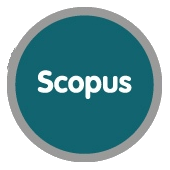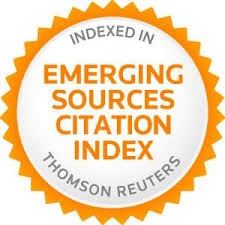Escala de motivación por el juego (EMJ): estudio del uso del juego en contextos educativos
Resumen
Palabras clave
Referencias
Abt, C. C. (1987). Serious games. Boston: University Press of America.
Aizencang, N. (2005). Jugar, aprender y enseñar: Relaciones que potencian los aprendizajes escolares. Buenos Aires: Manantial.
Alonso Tapia, J. (1997). Motivar para el aprendizaje. Teoría y estrategias Barcelona: Edebé.
Annetta, L. A. (2010). The "I's" have it: A framework for serious educational game design. Review of General Psychology, 14(2), 105-112. Doi: 10.1037/a0018985
Aubert, E., & Caba, B. (2010). Repertorio lúdico, infancia y escuela: pensando en términos del derecho del niño/a a jugar. In P. Sarlé (Ed.), Lo importante es jugar… Cómo entra el juego en la escuela. Buenos Aires: Homo Sapiens.
Bandura, A. (1997). Self-Efficacy: The Exercise of control. New York: W.H. Freeman and Company.
Bandura, A. (2002). Social cognitive theory in cultural context. Applied Psychology, 51(2), 269-290.
Bandura, A. (2012). On the functional properties of perceived self-efficacy revisited. Journal of Management, 38(1), 9-44.
Barrett, K., & Johnson, W. L. (2010). Developing serious games for learning language-in-culture. Interdisciplinary Models and Tools for Serious Games: Emerging Concepts and Future Directions. RV Eck. Hershey, PA, IGI Global.
Bland, J., & Altman, D. (1997). Cronbach's alpha. BMJ: British Medical Journal, 314(7080), 572.
Boekaerts, M. (1997). Self-regulated learning: A new concept embraced by researchers, policy makers, educators, teachers, and students. Learning and Instruction, 7(2), 161-186.
Brougère, G. (1995). Jeu et éducation. Paris: Editions L'Harmattan.
Brougère, G. (1999). Some Elements Relating to Children’s Play and Adult Simulaton/Gaming. Simulation & Gaming, 30(2), 134-146.
Caillois, R. (1958). Les, jeux et les hommes. Paris: Gallimard.
Connolly, T. M., Boyle, E. A., MacArthur, E., Hainey, T., & Boyle, J. (2012). A systematic literature review of empirical evidence on computer games and serious games. Computers & Education.
Cortina, J. (1993). What is coefficient alpha? An examination of theory and applications. Journal of applied psychology, 78(1), 98-104.
Cronbach, L. J. (2004). My Current Thoughts on Coefficient Alpha and Successor Procedures. Los Angeles, CA: Center for the Study of Evaluation (CSE)National Center for Research on Evaluation, Standards, and Student Testing (CRESST)Graduate School of Education & Information Studies.
Csikszentmihalyi, M. (1990). Flow: The psychology of optimal experience. NY: Harper-Row.
Davis, A. (2003). Teachers' and students' beliefs regarding aspects of language learning. Evaluation & Research in Education, 17(4), 207-222.
Deci, E. L., & Ryan, R. M. (1985). Intrinsic motivation and self-determination in human behavior. New York: Plenum.
Deci, E. L., & Ryan, R. M. (1999). A Meta-Analytic Review of Experiments Examining the Effects of Extrinsic Rewards on Intrinsic Motivation. Psychological bulletin, 125(6), 627-668.
Deci, E. L., Vallerand, R. J., Pelletier, L., & Ryan, R. M. (1991a). Motivation and education: The self-determination perspective. Educational Psychologist, 26(3&4), 325-346.
Deci, E. L., Vallerand, R. J., Pelletier, L. G., & Ryan, R. M. (1991b). Motivation and Education: The Self-Determination Perspective. Educational Psychologist, 26(3/4), 325-346.
Eccles, J., Adler, T. F., Futterman, R., Goff, S. B., Kaczala, C. M., Meece, J. L., . . . Spence, J. T. (1983). Expectancies, values, and academic behaviors Achievement and achievement motivation (pp. 75-146). San Francisco, CA: W.H.Freeman.
Eccles, J., & Wigfield, A. (2002). Motivational beliefs, Values and Goals. In S. T. Fiske, D. L. Schacter & C. Sahn-Waxler (Eds.), Annual Review of Psychology (pp. 109-132). Palo Alto, CA: Annual Reviews.
Elkonin, D. B. (1985). Psicología del juego. Madrid: Visor.
Galdames, V., Medina, L., San Martín, E., Gaete, R., & Valdivia, A. (2011). ¿Qué actividades realizan los docentes de NB1 para enseñar a leer y escribir? Enfoques tras las prácticas pedagógicas Docente Más. La Evaluación docente en Chile. Santiago: Pontificia Universidad Católica de Chile.
Garvey, C. (1977). El juego infantil. Madrid: Morata.
Gauntlett, D., Ackermann, E., Whitebread, D., Wolbers, T., & Wekstrom, C. (2010). The Future of Play. Billund: The LEGO Group.
Gollwitzer, P. M., & Oettingen, G. (2001). Motivation: the history of a concept. In N.J.Smelser & P. B. Baltes (Eds.), International Encyclopedia of the Social and Behavioral Sciences (pp. 10109-10112). Oxford: Elsevier.
Gómez, V., Guerra, P., & González, M. (2011). Explorando el cambio epistemológico y conceptual en la Formación Inicial de Profesores en distintos contextos universitarios Evidencias para políticas públicas en educación: Selección de Investigaciones Cuarto Concurso FONIDE (pp. 45-82). Retrieved from http://ded.mineduc.cl/mineduc/ded/documentos/Informe Final F410935 - Viviana Gomez - PUC.pdf
Gómez, V., Muñoz, C., Silva, I., González, M. P., Guerra, P., & Valenzuela, J. (2014). Creencias y oportunidades de aprendizaje en la práctica educativa en contextos de pobreza. Perfiles Educativos, 36(144), 173-188.
González, M. E. (1999). Creencias, atribuciones y autoeficacia en profesores de enseñanza básica municipalizada. (Tesis de Doctorado), Pontificia Universidad Católica de Chile, Santiago.
Graesser, A., Chipman, P., Leeming, F., & Biedenbach, S. (2009). Deep learning and emotion in serious games. Serious games: Mechanisms and effects, 81-100.
Guilford, J. P. (1954). Psychometric Methods. New York: McGraw-Hill.
Huizinga, J. (1955). Homo Ludens A Study of the Play-Element in Culture. Boston: Beacon Press.
Jarvinen, A. (2007). Games without Frontiers, Theories and Methods for Game Studies and Design. (PhD in Media Culture), University of Tampere, Finland.
Johnson, W. L., Vilhjalmsson, H., & Marsella, S. (2005). Serious Games for Language Learning: How Much Game, How Much AI? Paper presented at the Proceedings of the 2005 conference on Artificial Intelligence in Education: Supporting Learning through Intelligent and Socially Informed Technology.
Kagan, D. (1992). Implications of research on teacher belief. Educational Psychologist, 27(1), 65-90.
Kline, P. (1993). An easy guide to factor analysis. Newbury Park: Sage.
Latorre, M. (2002). Saber pedagógico en uso: análisis del saber actuante en las prácticas pedagógicas de profesores en ejercicio. (Tesis de Doctorado en cotutela), Pontificia Universidad Católica de Chile - Universidad René Descartes-Paris 5-Sorbonne, Santiago.
Latorre, M. (2005). Continuidades y rupturas entre Formación Inicial y ejercicio profesional docente. Revista Iberoamericana de Educación, 36(2), 7.
Marcelo, C. (1994). Formación del profesorado para el cambio educativo: PPU Barcelona.
Miller, C. T. (2008). Games: purpose and potential in education (Vol. 1): Springer Verlag.
Mourshed, M., Chijioke, C., & Barber, M. (2007). How the world's best-performing school systems come out on top [electronic resource] Retrieved from http://www.mckinsey.com/clientservice/socialsector/resources/pdf/Worlds_School_Systems_Final
Nakanishi, T. (2002). Critical Literature Review on Motivation. Journal of Language and Linguistics, 1(3).
Neuville, S., Frenay, M., & Bourgeois, É. (2007). Task Value, Self-Efficacy and Goal Orientations: Impact on self-regulated learning, choice and performance among university students. Psychologica Belgica, 47(1), 95-117.
Nunnally, J. C., & Bernstein, I. J. (1995). Teoría psicométrica. Madrid: Mc Graw Hill.
Olson, C. K. (2010). Children's motivations for video game play in the context of normal development. Review of General Psychology, 14(2), 180-187. Doi: 10.1037/a0018984
Piaget, J. (1945). La formation du symbole chez l'enfant. Genève: Délachaux et Niestlé.
Pintrich, P. R., & Schunk, D. (2005). Motivación y Aprendizaje. Madrid.
Preiss, D. D. (2009). The Chilean instructional pattern for the teaching of language: A video-survey study based on a national program for the assessment of teaching. Learning and Individual Differences, 19(1), 1-11.
Rogoff, B. (1990). Aprendices del pensamiento. Buenos Aires: Paidos.
Rosas, R., Nussbaum, M., Cumsille, P., Marianov, V., Correa, M., Flores, P., . . . López, V. (2003). Beyond Nintendo: design and assessment of educational video games for first and second grade students. Computers & Education, 40(1), 71-94.
Ryan, R. M., & Deci, E. L. (2000a). Intrinsic and Extrinsic Motivations: Classic Definitions and New Directions. Contemporary educational psychology, 25(1), 54-67.
Ryan, R. M., & Deci, E. L. (2000b). Self-determination theory and the facilitation of intrinsic motivation, social development, and well-being. American Psychologist, 55(1), 68-78.
Santos, J. R. A. (1999). Cronbach’s alpha: A tool for assessing the reliability of scales. Journal of extension, 37(2), 1-5.
Sarlé, P. (2001). Juego y aprendizaje escolar: los rasgos del juego en la educación infantil. Buenos Aires: Novedades Educativas.
Sarlé, P. (2006). Enseñar el juego y jugar la enseñanza. Buenos Aires: Paidós.
Sarlé, P. (2008). Enseñar en clave de juego. Buenos Aires: Ediciones Novedades Educativas.
Sarlé, P. (Ed.). (2010). El juego en el Nivel Inicial. Fundamentos y reflexiones en torno a su enseñanza. I. Propuestas de enseñanza. Buenos Aires: Organización de Estados Iberoamericanos (OEI).
Sarlé, P., & Rosas, R. (2012). Juegos de construcción y construcción del conocimiento. Buenos Aires: Miño y Dávila editores.
Schiefele, U. (1991). Interest, Learning, and Motivation. Educational Psychologist, 26(3/4), 299.
Silvia, P. J. (2006). Exploring the Psychology of Interest. Oxford: Oxford University Press.
Stein, A., Migdalek, M., & Sarlé, P. (2012). "Te Enseño a Jugar": Caracterización de Movimientos Interaccionales y Formas Lingüísticas Mediante las Cuales se Regula la Interacción Lúdica. Psykhe (Santiago), 21(1), 55-67.
Streiner, D. L. (2003). Starting at the Beginning: An Introduction to Coefficient Alpha and Internal Consistency. Journal of Personality Assessment, 80(1), 99-103.
Sutton-Smith, B. (2009). The ambiguity of play. Harvard University Press.
Urdan, T., & Karabenick, S. (2010). The Decade Ahead: Theoretical Perspectives on Motivation and Achievement. London: Emerald Group Publishing.
Valenzuela, J. (2007). Más allá de la tarea: Pistas para una redefinición del concepto de Motivación Escolar. Educaçao e Pesquisa 33(3), 409-426.
Valenzuela, J., Precht, A., Muñoz, C., & Silva-Peña, I. (2014). Informe Final Fondecyt 1120351: Estudio de las Representaciones de la Motivación Escolar, Autoeficacia y Sentido del Aprendizaje Escolar: Aportes para el mejoramiento de la formación motivacional de los docentes. Santiago: Fondo Nacional de Ciencia y Tecnología.
Van Driel, J. H., Bulte, A. M. W., & Verloop, N. (2007). The relationships between teachers' general beliefs about teaching and learning and their domain specific curricular beliefs. Learning and Instruction, 17(2), 156-171.
Vansteenkiste, M., Lens, W., & Deci, E. L. (2006). Intrinsic versus extrinsic goal contents in self-determination theory: Another look at the quality of academic motivation. Educational Psychologist, 41(1), 19-31.
Vansteenkiste, M., Simons, J., Lens, W., Sheldon, K., & Deci, E. L. (2004). Motivating learning, performance, and persistence: The synergistic effects of intrinsic goal contents and autonomy-supportive contexts. Journal of Personality and social Psychology, 87(2), 246-260.
Viau, R. (2009). La motivation en contexte scolaire. Bruxelles: De Boeck.
Vigotsky, L. (1967). Play and its role in the mental development of the child. Soviet Psychology, 5, 6-18. https://epress.anu.edu.au/archive/vygotsky/works/1933/play.htm
Whitebread, D., Bingham, S., Grau, V., Pasternak, D. P., & Sangster, C. (2007). Development of metacognition and self-regulated learning in young children: Role of collaborative and peer-assisted learning. Journal of Cognitive Education and Psychology 6(3), 433.
Wigfield, A., & Cambria, J. (2010a). Expectancy-value theory: Retrospective and prospective. Advances in motivation and achievement, 16, 35-70.
Wigfield, A., & Cambria, J. (2010b). Students' achievement values, goal orientations, and interest: Definitions, development, and relations to achievement outcomes. Developmental Review, 30(1), 1-35.
Wigfield, A., & Eccles, J. (2000). Expectancy-Value Theory of Achievement Motivation. Contemporary educational psychology, 25(1), 68-81.
Wouters, P., van der Spek, E. D., & van Oostendorp, H. (2009). Current Practices in Serious Game Research: A Review from a Learning Outcomes Perspective In T. M. Connolly, M. Stansfield & L. Boyle (Eds.), Games-based learning advancements for multi-sensory human computer interfaces: techniques and effective practices (pp. 232-250): Information Science Publishing.
Enlaces refback
- No hay ningún enlace refback.


